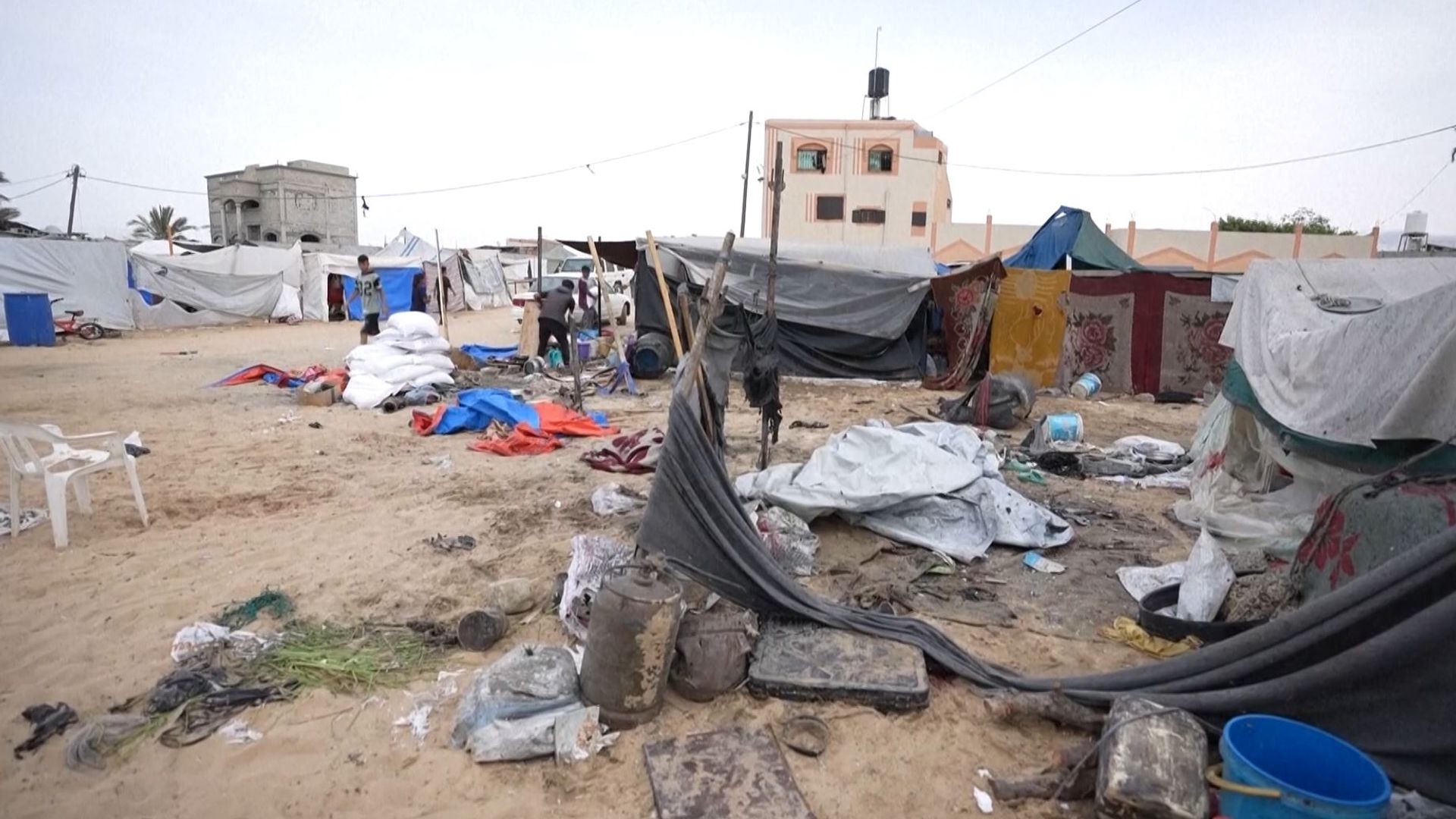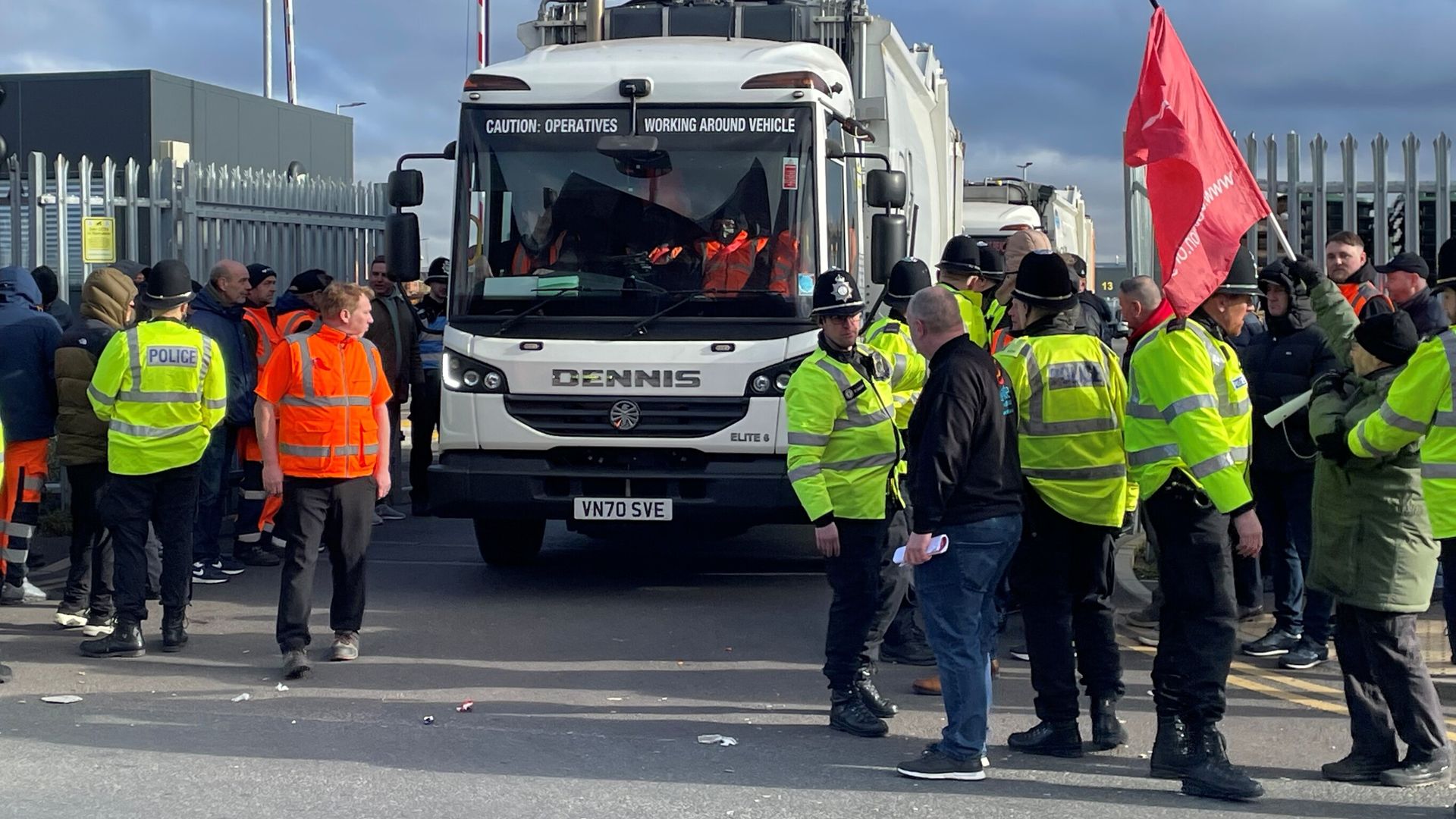More than 20 people have been killed in Israeli tank shelling on a tent camp in Gaza, according to Palestinian health officials.
It comes amid widespread outrage over Israel’s bombing two days earlier of another camp where at least 45 lives were lost.
On Tuesday, four tank shells hit a cluster of tents for displaced families in a designated humanitarian zone in al Mawasi, western Rafah, killing 21 people, emergency services told Reuters.
At least 12 of the victims were women, medical officials said.
The Israel Defence Forces (IDF) said it did not strike in the humanitarian area of al Mawasi.
Latest updates on Israel-Hamas war
Israel had launched an airstrike on the Tel al Sultan area of western Rafah on Sunday night that ignited a fire in a camp for displaced Palestinians. At least 45 people, around half of them women and children, were killed, according to local health officials.
Rishi Sunak faces calls for UK to follow Spain, Norway and Ireland in recognising Palestinian state
Israeli Prime Minister Benjamin Netanyahu says airstrike on Rafah which killed dozens was ‘tragic mistake’
International Court of Justice orders Israel to halt Rafah offensive
The deadly bombing sparked global condemnation. Israeli Prime Minister Benjamin Netanyahu called it a “tragic mistake”.
The Israeli military on Tuesday claimed its initial investigation into the strike indicated the fire was caused by a secondary explosion.
Rear Admiral Daniel Hagari, the chief military spokesman, claimed Israel’s military fired two 17kg munitions that targeted two senior Hamas militants.
He claimed the munitions would have been too small to ignite a fire on their own, and that the military was looking into the possibility that weapons were stored in the area.
It has not been possible to independently verify his claims.
The fire triggered by the bombing also could have ignited fuel, cooking gas canisters or other materials in the densely populated tent camp housing displaced people.
Israel’s closest allies have been among those who have strongly condemned the killings.
Nearly a million have been forced to flee Rafah since Israel launched an incursion there in early May. Most of the people had already been displaced by Israeli attacks.
They now seek refuge in squalid tent camps and other war-ravaged areas.
The US and other close allies of Israel have warned against a fully-fledged offensive in the city, with the Biden administration saying that would cross a red line and refusing to provide offensive arms for such an operation.
On Friday, the International Court of Justice – the UN’s top court – ordered Israel to halt its Rafah offensive – although Israel looks set to ignore the demand.
Israel claims it is carrying out limited operations in eastern Rafah along the Gaza-Egypt border, although residents also reported heavy bombardment overnight in western parts of Rafah.
Read more
Benjamin Netanyahu says airstrike on Rafah which killed dozens was ‘tragic mistake’
Rafah is ‘hell on Earth’, warns UN agency head – as outrage grows
Sayed al Masri, a Rafah resident, said many families had been forced to flee their homes and shelters, with most heading for the crowded area of al Mawasi, where giant tent camps have been set up on a barren coastline, or to Khan Younis, a southern city that suffered heavy damage during months of fighting.
Gaza’s health ministry said two medical facilities in Tel al Sultan were out of service because of intense bombing nearby.
Medical Aid for Palestinians, a charity operating throughout the territory, said the Tel al Sultan medical centre and the Indonesian Field Hospital were under lockdown, with medics, patients and displaced people trapped inside.
Keep up with all the latest news from the UK and around the world by following Sky News
Most of Gaza’s hospitals are no longer functioning. The Kuwait Hospital in Rafah shut down on Monday after a strike near its entrance killed two health workers.
A spokesperson for the World Health Organisation said the casualties from Sunday’s strike and fire “absolutely overwhelmed” field hospitals in the area, which were already running short on supplies to treat severe burns.
The Israeli offensive began after Hamas and other militants burst into southern Israel in a surprise attack on 7 October, killing around 1,200 people and abducting around 250 others. More than 100 were released during a ceasefire in November in exchange for Palestinians imprisoned by Israel.
Israel responded to the attack with a huge air and land offensive that has killed at least 36,096 Palestinians in Gaza, according to the Hamas-run health ministry.
Around 80% of Gaza’s population of 2.3 million has been displaced and United Nations officials say parts of the territory are experiencing famine.





